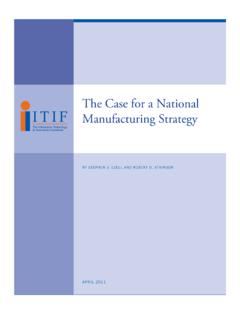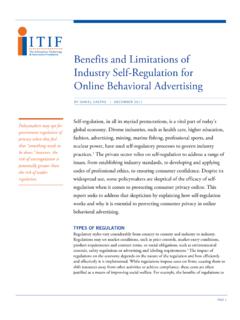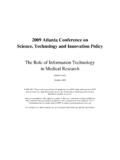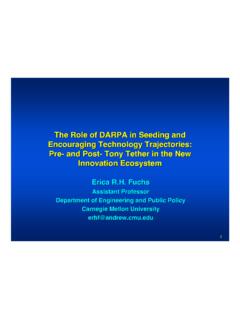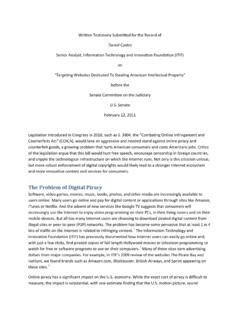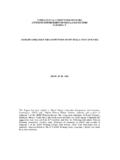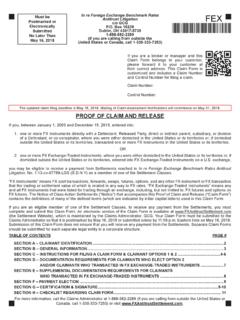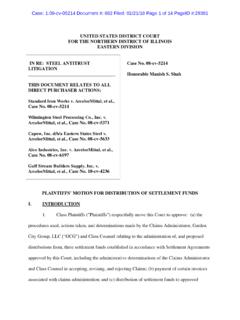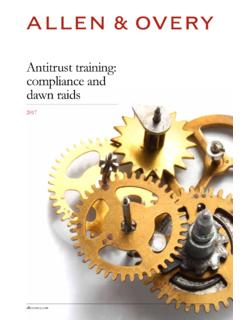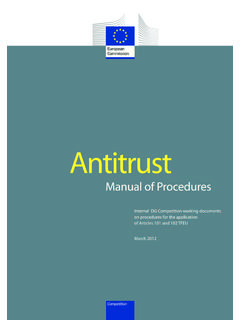Transcription of Economic Doctrines and Approaches to Antitrust - …
1 PAGE 1 Economic Doctrines and Approaches to Antitrust BY ROBERT D. ATKINSON AND DAVID B. AUDRETSCH | JANUARY 2011 There is considerable disagreement over optimal Antitrust Some propose a weak role for Antitrust authorities, others a strong role. These differences don t stem principally from politics, in the sense of different interests expressing different views. Rather, they stem from differences in the overall Antitrust doctrine held by regulators, other policymakers, scholars and advocates. In fact, at least four separate schools of Antitrust philosophy can be identified, each reflecting a different core Economic doctrine. Recognizing that virtually all Antitrust analysis and opinion emanates from one of these four well-defined schools of thought should help policymakers better understand issues of competition and hopefully make better decisions.
2 This report lays out the four dominant Economic Doctrines influencing positions on Antitrust : conservative neoclassical economics and in the context of Antitrust , its analogue the Chicago school; liberal neoclassical economics and the post-Chicago school; liberal neo-Keynesian economics and the populist school of Antitrust ; and innovation economics and the innovation school. It then examines the four schools Approaches to Antitrust issues, including merger and monopoly, collusion, and pricing. Finally, it examines how different Approaches to Antitrust by different nations (and multinational regions like the EU) stem from the different Antitrust Doctrines of policymakers. The report argues that the three conventional Doctrines (Chicago, post-Chicago, and populist) are inadequate guides to effective Antitrust policy in the twenty-first century, in part because they do not adequately incorporate dynamic factors and As Hart The key to unraveling the Antitrust riddle lies in disentangling differences among the fundamental economics Doctrines underlying the disparate views towards Antitrust .
3 These differences reflect diverging views not only on how the economy works, but also on what the main goals or priorities for the economy should be. PAGE 2 THE INFORMATION TECHNOLOGY & INNOVATION FOUNDATION | JANUARY 2011 notes, interest in technological innovation among Antitrust policy makers is sporadic and relatively rare over the long run. 3 The innovation school of Antitrust attempts to remedy that and promises to be a more effective guide for competition policy in the twenty-first century. ECONOMICS AND Antitrust : SCIENCE OR Doctrines ? Many economists like to portray their field as a science, with economists serving as the sole arbiters of Economic truth. In fact, economics has much in common with philosophy different people have different Doctrines .
4 As Schumpeter once stated, the majority of economists .. are ready enough to admit its [ideologies] presence, but like Marx, they find it only in others and never in themselves. They do not admit that it is an inescapable curse and vitiates economics to its core. 4 As such, when considering Economic issues it is important to realize that much of what appears to be objective theorizing and unbiased empirical analysis is, in fact, deeply shaped by the doctrine of the economist. Economists and policy makers beliefs about what policy works best for the economy, including their beliefs about the appropriate approach to Antitrust , are not simply independent thoughts applied anew to each situation; rather such beliefs constitute and are a reflection of coherent world views or Doctrines , which in turn, profoundly shape how they view the economy, what they see as important and not impor-tant, and most importantly, what they believe is correct public policy and what is not.
5 Moreover, it s not just economists working at the Federal Reserve, on Congressional committees, or in think tanks that subscribe to particular economics Doctrines . Virtually all policymakers involved in Economic policy subscribe to a particular economics doctrine, even if they may not be aware of which it is. Indeed, as John Maynard Keynes himself once stated, Practical men, who believe themselves to be quite exempt from any intellectual influences, are usually the slaves of some defunct economist. These Economic Doctrines guide the thinking and deliberations of practical men (and women) and help them make sense of a complex, rapidly-changing economy with limited data and knowledge. Because Antitrust at its heart involves the application of legal theory and analysis to Economic problems, it should not be surprising that Economic Doctrines shape Approaches to Antitrust .
6 As Caulkins notes, Legal standards are informed by economics, moreover, so as economics evolves the law may evolve with it. 5 In fact, while many Antitrust scholars prefer to portray the field as a scientific one based on objective analysis and careful reason, some scholars have argued that Antitrust has been more based on core values and Doctrines , and that these significantly influence views of Antitrust issues (such as monopolization, vertical arrangements, and so forth) and particular cases. As Page notes, there has long been tension within Antitrust between two views: what he calls the intentional vision and the evolutionary The intentional vision grounded in the Keynesian Economic doctrine views the market as a mechanism within which powerful interests can coerce consumers, labor, and small businesses.
7 Here, Antitrust is seen as a tool for fairness, distribution and political In this view, Page notes, Virtually all Economic policymakers subscribe to a particular economics doctrine, even if they may not be aware of which it is. PAGE 3 THE INFORMATION TECHNOLOGY & INNOVATION FOUNDATION | JANUARY 2011 market structures consequently tend toward monopoly and because of this should be corrected by active government intervention. In contrast, the evolutionary vision grounded in the neoclassical economics doctrine views the market, framed solely by common law rules of property and contract, as a mechanism for facilitating free exchanges among countless individuals in the pursuit of their best interests.
8 Markets, in this vision, will destroy monopoly without government intervention. Page goes on to argue that, The influence of versions of these ideologies is apparent throughout Antitrust history .. the 1890 Sherman Act embodied a legislative compromise between these two visions. This compromise was not a settlement between opposing identifiable factions in Congress, but rather a synthesis of elements of opposing world views. 8 Ultimately, in the absence of strong empirical evidence, debates over the appropriate approach to Antitrust boil down to ideology. As Jacobs notes, To the question of why refrain (or intervene), Chicagoans would claim that, for the most part, markets function efficiently and courts do not.
9 Post-Chicagoans would argue precisely the opposite .. [both] their theses rest on unproven beliefs about markets and government. He goes on to argue, At bottom, the debate between Chicago and post-Chicago economists implicates contending articles of political faith. Although the disputants fail to acknowledge it, the absence of empirical proof about the efficiency effects of many business practices, the competitive consequences of large firm size, the proclivity of firms to collude, and the efficiency of government intervention has not only retarded the emergence of clear answers to the questions under debate, but as also obscured the very nature of the debate. 9 In 1988, Audretsch wrote discordance is alive and well in Antitrust .
10 10 Almost a quarter of a century later, little has changed. But few Antitrust scholars or practitioners want to ground their work on the shifting sands of ideology. Rather, holders of different Doctrines seek to claim sole universality and truth. As Waller argues, Typically each side searches and researches a well-worn body of case law and legislative history for undiscovered clues concerning the intent of various Congresses that passed the Antitrust statutes or other previously undetected nuggets that support the normative vision of the commentator. 11 Indeed, he notes that Antitrust is a social, Economic , and political construct that takes on different legal understandings in different contexts and at different historical moments.
